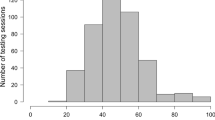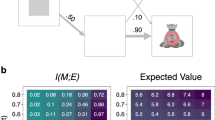Abstract
Flow represents a valuable daily life experience as it is linked to performance, growth, and well-being. As flow support is still a major challenge due to a lack of automatic and unobtrusive detection methods, NeuroIS scholars face the opportunity to devise measurement approaches for flow experience during IS use and, moreover, flow supporting, adaptive NeuroIS. This work presents the first results from a controlled experience sampling field study in which experiences were observed using video recordings during a week of scientific writing. Novel behavioral features (face and head activity) with negative flow-report correlations are identified. Together, the results contribute to the NeuroIS community by providing an extended concept of flow as a state of behavioral efficiency, the identification of novel correlates, and recommendations for economical and feasible extensions of the study approach.
Access this chapter
Tax calculation will be finalised at checkout
Purchases are for personal use only
Similar content being viewed by others
References
Spurlin, S., Csikszentmihalyi, M.: Will work ever be fun again? In: Fullagar, C.J., Delle Fave, A. (eds.) Flow at Work: Measurement and Implications, pp. 176–187 (2017)
Riedl, R., Fischer, T., Léger, P.-M., Davis, F.D.: A decade of NeuroIS research: progress, challenges, and future directions. ACM SIGMIS Database DATABASE Adv. Inf. Syst. 51, 13–54 (2020)
Knierim, M.T., Rissler, R., Hariharan, A., Nadj, M., Weinhardt, C.: Exploring flow psychophysiology in knowledge work. In: Davis, F.D., Riedl, R., vom Brocke, J., Léger, P.-M., Randolph, A.B. (eds.) Information Systems and Neuroscience. LNISO, vol. 29, pp. 239–249. Springer, Cham (2019). https://doi.org/10.1007/978-3-030-01087-4_29
Rissler, R., Nadj, M., Li, M.X., Knierim, M.T., Maedche, A.: Got flow? Using machine learning on physiological data to classify flow. In: Extended Abstracts of the 2018 CHI Conference on Human Factors in Computing Systems, pp. 1–6 (2018)
Moneta, G.B.: On the measurement and conceptualization of flow. In: Engeser, S. (ed.) Advances in Flow Research, pp. 23–50. Springer, New York (2012). https://doi.org/10.1007/978-1-4614-2359-1_2
Knierim, M.T., Rissler, R., Dorner, V., Maedche, A., Weinhardt, C.: The psychophysiology of flow: A systematic review of peripheral nervous system features. In: Davis, F.D., Riedl, R., vom Brocke, J., Léger, P.-M., Randolph, A.B. (eds.) Information Systems and Neuroscience. LNISO, vol. 25, pp. 109–120. Springer, Cham (2018). https://doi.org/10.1007/978-3-319-67431-5_13
Léger, P.M., Davis, F.D., Cronan, T.P., Perret, J.: Neurophysiological correlates of cognitive absorption in an enactive training context. Comput. Hum. Behav. 34, 273–283 (2014)
Gaggioli, A., Cipresso, P., Serino, S., Riva, G.: Psychophysiological correlates of flow during daily activities. In: Wiederhold, B.K., Riva, G. (eds.) Annual Review of Cybertherapy and Telemedicine 2013, pp. 65–69. IOS Press (2013)
Rouast, P.V., Adam, M.T.P., Chiong, R., Lux, E.: Remote heart rate measurement using low-cost RGB face video: a technical literature review. Front. Comp. Sci. 1, 1–15 (2016)
Mauri, M., Cipresso, P., Balgera, A., Villamira, M., Riva, G.: Why is Facebook so successful? Psychophysiological measures describe a core flow state while using Facebook. Cyberpsychol. Behav. Soc. Netw. 14, 723–731 (2011)
Kivikangas, J.M., Puttonen, S.: Psychophysiology of flow experience: an explorative study (2006)
Peifer, C.: Psychophysiological correlates of flow-experience. In: Engeser, S. (ed.) Advances in Flow Research, pp. 139–164. Springer, New York (2012). https://doi.org/10.1007/978-1-4614-2359-1_8
Nakamura, J., Csikszentmihalyi, M.: Flow theory and research. In: Lopez, S., Snyder, C.R. (eds.) Oxford Handbook of Positive Psychology, pp. 195–206. Oxford University Press, New York (2009)
Peifer, C., Schulz, A., Schächinger, H., Baumann, N., Antoni, C.H.: The relation of flow-experience and physiological arousal under stress - can u shape it? J. Exp. Soc. Psychol. 53, 62–69 (2014)
Labonté-Lemoyne, É., et al.: Are we in flow? Neurophysiological correlates of flow states in a collaborative game. In: Proceedings of the 2016 CHI Conference, pp. 1980–1988 (2016)
Engeser, S., Schiepe-Tiska, A.: Historical lines and an overview of current research on flow. Adv. Flow Res. 9781461423, 1–22 (2012)
Kivikangas, J.M.: Psychophysiology of flow experience: an explorative study (2006)
de Manzano, Ö., Theorell, T., Harmat, L., Ullén, F.: The psychophysiology of flow during piano playing. Emotion 10, 301–311 (2010)
Ullén, F., De Manzano, Ö., Theorell, T., Harmat, L.: The physiology of effortless attention: correlates of state flow and flow proneness. In: Bruya, B. (ed.) Effortless Attention: A New Perspective in the Cognitive Science of Attention and Action, pp. 205–217. MIT Press, Cambridge (2010)
Holodynski, M., Friedlmeier, W.: Development of Emotions and Emotion Regulation. Springer, Heidelberg (2006)
Höfling, T.T.A., Gerdes, A.B.M., Föhl, U., Alpers, G.W.: Read my face: automatic facial coding versus psychophysiological indicators of emotional valence and arousal. Front. Psychol. 11, 1–15 (2020)
Calvo, R.A., Mello, S.D.: Affect detection : an interdisciplinary review of models, methods, and their applications. IEEE Trans. Affect. Comput. 1, 18–37 (2010)
Dupré, D., Krumhuber, E.G., Küster, D., McKeown, G.J.: A performance comparison of eight commercially available automatic classifiers for facial affect recognition. PLoS ONE 15, e0231968 (2020)
Skiendziel, T., Rösch, A.G., Schultheiss, O.C.: Assessing the convergent validity between the automated emotion recognition software Noldus FaceReader 7 and facial action coding system scoring. PLoS One 14, 1–18 (2019)
Csikszentmihalyi, M., Hunter, J.: Happiness in everyday life: The uses of experience sampling. J. Happiness Stud. 4, 185–199 (2003)
Engeser, S., Rheinberg, F.: Flow, performance and moderators of challenge-skill balance. Motiv. Emot. 32, 158–172 (2008)
Knierim, M.T., Nadj, M., Hariharan, A., Weinhardt, C.: Flow neurophysiology in knowledge work: electroencephalographic observations from two cognitive tasks. In: 5th International Conference on Physiological Computing Systems (PhyCS), pp. 42–53 (2018)
Harris, D.J., Vine, S.J., Wilson, M.R.: Flow and quiet eye: the role of attentional control in flow experience. Cogn. Process. 18(3), 343–347 (2017). https://doi.org/10.1007/s10339-017-0794-9
Quinn, R.W.: Flow in knowledge performance experience. Adm. Sci. Q. 50, 610–641 (2005)
Keller, J.: The flow experience revisited: the influence of skills-demands-compatibility on experiential and physiological indicators. In: Harmat, L., Ørsted Andersen, F., Ullén, F., Wright, J., Sadlo, G. (eds.) Flow Experience, pp. 351–374. Springer, Cham (2016). https://doi.org/10.1007/978-3-319-28634-1_21
Bakdash, J.Z., Marusich, L.R.: Repeated measures correlation. Front. Psychol. 8, 1–13 (2017)
Bakker, A.B.: Flow among music teachers and their students: the crossover of peak experiences. J. Vocat. Behav. 66, 26–44 (2005)
Harris, D.J., Vine, S.J., Wilson, M.R.: Neurocognitive mechanisms of the flow state. Prog. Brain Res. 237, 221–243 (2017)
Swann, C., Keegan, R.J., Piggott, D., Crust, L.: A systematic review of the experience, occurrence, and controllability of flow states in elite sport. Psychol. Sport Exerc. 13, 807–819 (2012)
Rouast, P.V., Adam, M.T.P., Chiong, R., Cornforth, D.J., Lux, E.: Remote heart rate measurement using low-cost RGB face video: a technical literature review. Front. Comput. Sci. (2016). In Press
Author information
Authors and Affiliations
Corresponding author
Editor information
Editors and Affiliations
Rights and permissions
Copyright information
© 2021 The Author(s), under exclusive license to Springer Nature Switzerland AG
About this paper
Cite this paper
Berger, C., Knierim, M.T., Weinhardt, C. (2021). Detecting Flow Experiences in the Field Using Video-Based Head and Face Activity Recognition: A Pilot Study. In: Davis, F.D., Riedl, R., vom Brocke, J., Léger, PM., Randolph, A.B., Müller-Putz, G. (eds) Information Systems and Neuroscience. NeuroIS 2021. Lecture Notes in Information Systems and Organisation, vol 52. Springer, Cham. https://doi.org/10.1007/978-3-030-88900-5_14
Download citation
DOI: https://doi.org/10.1007/978-3-030-88900-5_14
Published:
Publisher Name: Springer, Cham
Print ISBN: 978-3-030-88899-2
Online ISBN: 978-3-030-88900-5
eBook Packages: Computer ScienceComputer Science (R0)




